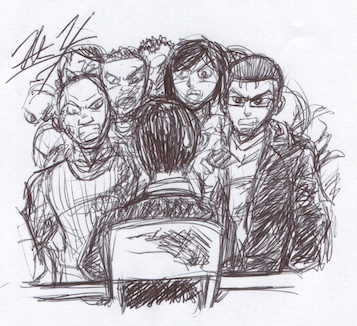Parents request change to athletic code
Glenbard West incident sparks outrage

Parents, students and concerned citizens attend the District 87 board meeting on September 8th.
September 21, 2014
This summer a group of around 30 Glenbard West athletes were found to be in violation of the Glenbard High School District 87 athletic code, which forbids athletes to attend parties “where the athlete or others are using or in possession of any illegal or controlled substance, including marijuana, alcohol.”
In August, a large group of students, parents and concerned citizens attended the Glenbard Board of Education meeting to either support or protest the current athletic code set forth by the school district.
As the code stated, a student could break the athletic code by attending a traditional party, Lollapalooza or even a Fourth of July family get together where of-age family members would drink alcohol. If disciplined under the discretion of a dean or athletic director, an athlete in violation of the code for the first time might be suspended for 20 percent of his or her respective sport’s season. However, several student-athletes at Glenbard West were on their second offense this summer; therefore, according to district policy they were suspended from their sport for the entire season.
New Glenbard South Assistant Principal for Athletics Tim Carlson noted the escalation of the three pronged system stating that if a student violates this policy for a third time, he or she is banned from high school athletics for the rest of his or her high school career.
A number of Glenbard West students were found to be in violation of the code for a second time this summer. A number of their parents and others urged the school board to revise the code because they claimed it was unfair and illogical in today’s world.
Dean Elger, a member of the District 41 School Board, had his wife read a statement in support of the suspensions at the meeting that read, “I am most disappointed that a group of parents would argue against the imposition of penalties that (students) and their parents agreed to by signing the athletic code. They are instead teaching that rules apply to other people, and maybe if you argue long enough, you can get away with any bad behavior.”
Many, though, argued that the code is useful in high schools. Dr. Ralph Hingson, member of the National Institute on Alcohol Abuse and Alcoholism said that teenagers who started drinking early have been seven times more likely to be in an alcohol-related crash. Alcohol has harmed teenagers even if they have not been behind the wheel. According to the National Institute of Health, alcohol has changed an adolescent’s developing brain, affecting mood, behavior, ability to think and coordination. Alcohol has also caused teenagers to develop Alcohol Use Disorder, or AUD, a disorder in which alcohol use has negatively affected their life. An estimated 855,000 teenagers aged 12-17 in the United States have been diagnosed with AUD.
Because of the possible dangers alcohol has had on high schoolers, Glenbard Township’s Community Relations Coordinator Peg Mannion said in an interview, “The school board’s greatest concern is a student’s safety.”
A Glenbard West parent of three said that the administration’s punishment for the athletic code was overly harsh, and another parent pleaded with the Board to rethink its decision to suspend his son from football for an entire season. However, all efforts failed to sway the board’s opinion. District Superintendent David Larson commented after the meeting, “We don’t make decisions in a reactionary way, (and) we don’t make decisions from political pressure or emotional pressure.”

Illustration represents the conflict at the District 87 Board Meeting
In reference to the specific event, South’s Assistant Principal for Athletics Tim Carlson said, “ [The situation is] pretty cut and dry.There was a code in place. That code was violated, and their code was levied against them.”
Another parent stated that the code has been overreaching, and that it should allow freedom for the administration to address different cases based on circumstance. Connor Loftus, a former West student, conversely, stated that administrators have too much freedom to determine punishments, so different students may be punished in different ways for the same offense. This discretion could allow for discrimination among students.
Furthermore, a mother of three Glenbard West students claimed that the athletic code is arbitrarily enforced. Most parents in attendance agreed that the athletic code is impossible to implement fairly.
Community Relations Coordinator Peg Mannion disagreed with the parent’s arguments and stated, “There is a very thorough process that is followed to enforce the athletic code.”
One speaker questioned the authority of the board to make rehabilitation mandatory. She stated that it should be the parents’ decision. Mannion also rebutted her claim saying, “It is important for students to learn healthier ways to go through life.”
Another speaker stated that although the code has not changed in the last 15 years, the interpretation has. Mannion, who has been Community Relations Coordinator for the last 10 years, did not believe the consequences have been enforced differently than they were when she first started at Glenbard.
As Ms. Mannion pointed out, “The athletic code is something given for all student athletes and parents to read and sign off on that they are in agreement of.”
Board meeting attendee Bill Samson argued that although parents and students have been given the athletic code, they have no say in the matter. Those who supported the code and the district’s decision believe that the concerned parents have forgotten that playing sports at any Glenbard school is a privilege binded by the athletic code contract.
A parent of two Glenbard West students argued that students should not be punished for being at an event where they did not have knowledge that alcohol would be present. But Glenbard South’s Assistant Director Tim Carlson pointed out that students had free will to leave when they realized that the party has alcohol. In isolated cases where the athlete in question did not not know that alcohol or drugs were being consumed at the party, the Board has investigated and used discretion when they weighed a punishment.
In fact, in all cases with such ambiguity, Mr. Carlson hoped that the Board would be thorough in its investigation. One parent speaking on behalf of his son did not think the investigation for this particular case was very thorough as the timing was very short.
A current Glenbard West student argued that athletes represent student leaders and that the code has been formed to make them set a good example to others. Conversely, a former athlete argued that the code has prevented athletes from being student leaders because it did not allow the athletes to be there in the first place to set a good example.
A large number of those who spoke that night asked the Board to review the code. Within this group, a smaller subsection offered to help the Board make a new code. Some gave recommendations for the new code. A father of a Glenbard West graduate pointed out that in researching other school codes, there was much variety in rulings. He suggested that the Board look at other districts’ codes for suggestions of a new rule. A parent of a current Glenbard West student even recommended a peer judge and jury.
The Board has agreed to review the code, and Assistant Director Tim Carlson stated, “I think that’s progressive.”
































are you kidding me • Aug 19, 2016 at 6:53 pm
It is great that we think it is right to punish students for actions they are not the cause of. Lets see if teachers and board members would sign a similar agreement under any condition. I am guessing the teachers union would step in and call it unconstitutional. Teenagers have more pressure then ever before, lets just stack this on top of all that and see how it turns out, great job, way to go people. I what to know who is responsible for this policy so when a kid kills himself due to this pressure they are held accountable. Now if a child is breaking the law punish him, but do not make my child responsible for other children and their actions. Kids will learn how to work around this and we better be ready for the consequences we cause. Maybe a positive image of a child not drinking and having a good time is what is needed. This policy is over reaching, and the only reason it is here is that it can be forced on the children. Maybe the kids and their parents should form a union and boycott playing until this is worked into a reasonable policy,.
Anon • Oct 3, 2014 at 9:36 am
Once again, Glenbard Parents are trying to get their way…Best be careful, someone will try to get the board members fired over this!
In my opinion, if a student is at a party that involves alcohol and drugs, that student should be reprimanded by the rules they signed. You signed a contract, you don’t get to just argue or cry your way out of it when you do break a rule. This is why there are so many kids, especially at south, who run around with the “I am untouchable” attitude, it’s disgusting, and it comes from their parents pushing their wealth and god complex attitudes onto their kids.
l a • Sep 23, 2014 at 2:18 pm
I agree with the Glenbard policy enforcing the district’s alcohol and drug policy. Parents, this is a pivotal life event teaching your kids that there are consequences for every bad decision you make in life, and no parent should try to circumvent that process. The parents & kids knew what the consequences would be, and hoped that noone would find out, or that they would be treated differently because they were an athlete. My son recently was pulled over and ticketed for talking on his cell phone without a headset. He has been without a phone for 2 months and hasnt driven his car either. He now walks to and from his job which gets him home at 1030 at night. My husband and I will not drive or pick him up, but have provided him with a rainjacket and umbrella. He is paying us for the cost of the ticket and fees as well. Initially he was shocked we did not allow him his phone or driving privileges for this length of time, but you can bet he will think twice before speaking on his phone while driving in the future..Stop the enabling people..